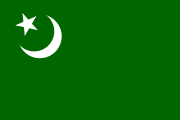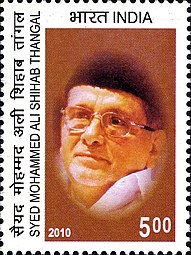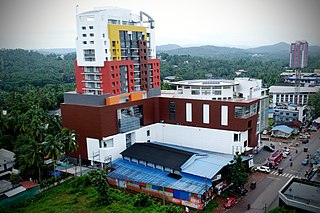
Malappuram, is one of the 14 districts in the Indian state of Kerala, with a coastline of 70 km (43 mi). The most populous district of Kerala, Malappuram is home to around 13% of the total population of the state. The district was formed on 16 June 1969, spanning an area of about 3,554 km2 (1,372 sq mi). It is the third-largest district of Kerala by area. It is bounded by Western Ghats and the Arabian Sea on either side. The district is divided into seven Taluks: Eranad, Kondotty, Nilambur, Perinthalmanna, Ponnani, Tirur, and Tirurangadi.

Indian National League (INL) is an Indian political party formed in 1994 under the leadership of the then IUML leader Ebrahim Sulaiman Sait. The party is currently a member of the CPIM-led LDF in Kerala. Indian National League leader Ahamed Devarkovil, Member of the Legislative Assembly from Kozhikode South Constituency, serves as a minister in the Second Pinarayi Vijayan ministry.

Muslim Youth League, abbreviated as the Youth League, is the youth wing of the Indian Union Muslim League.

Malappuram is a city and the headquarters of the Malappuram district in Kerala, India. It is the 4th largest urban agglomeration in Kerala and the 20th largest in India and a city in the Indian state of Kerala, spread over an area of 158.20 km2 (61.08 sq mi) including the surrounding suburban areas. The first municipality in the district formed in 1970, Malappuram serves as the administrative headquarters of Malappuram district. Divided into 40 electoral wards, the city has a population density of 4,800 per square kilometre. According to the 2011 census, the Malappuram metropolitan area is the fourth largest urban agglomeration in Kerala after Kochi, Calicut, and Thrissur urban areas and the 20th largest in India with a total population of 3 million. It is the fastest growing city in the world with a 44.1% urban growth between 2015 and 2020 as per the survey conducted by Economist Intelligence Unit (EIU) based on the urban area growth during January 2020. Malappuram is situated 54 km southeast of Calicut and 90 km northwest of Palakkad. It is the first Indian municipal body to provide free Wi-Fi connectivity to its entire residents. Malappuram is also the first Indian municipal body to achieve the International Organization for Standardization certificate. It is also the first complaint-free municipality in the state.

E. Ahamed, Edappakath Ahamed in full, was an Indian politician from Kannur in northern Kerala. A Member of Parliament between 1991 and 2017, he was a key figure in India's diplomatic relations with the Middle East.
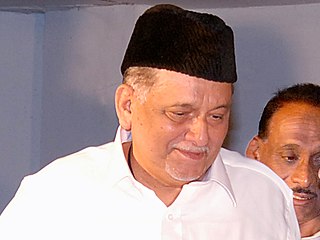
Mohammedali Shihab Thangal, known with the honorific prefix Sayed, was an Indian community leader, Islamic scholar and politician from Kerala. He is sometimes regarded as "the most important Mappila leader" of modern Kerala.

Chandrika is an Indian daily newspaper in Malayalam language published from Kozhikode, Kerala. The newspaper currently serves as the mouthpiece of Indian Union Muslim League party in Kerala.
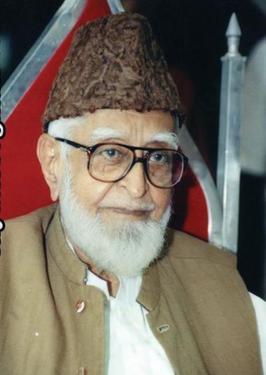
Ebrahim Sulaiman Sait, known as "Mehboob-e-Millat", was an Indian politician, born in Bangalore in a Cutchi Memon family, who served as an Indian Union Muslim League Member of Parliament from northern Kerala several times. He was also a founding member of All India Muslim Personal Law Board.

Panakkad Sayed Hyderali Shihab Thangal was a sayyid (thangal) community leader and religious scholar from Kerala, southern India who was the Kerala State President and Chairman, National Political Advisory Committee, Indian Union Muslim League from 2009 to 2022. He was also the Vice President of the Samastha Kerala Jam'iyyat al-'Ulama', the principal Sunni-Shafi'i scholarly body in Kerala.

E. T. Mohammed Basheer is an Indian politician and social worker who serves as the Member of Parliament from Ponnani Parliament Constituency of the Indian state Kerala.

P. K. Kunhalikutty is an Indian politician and social worker who is the present Member of Legislative Assembly from Vengara Assembly Constituency in Kerala. He also serves as National General Secretary of Indian Union Muslim League (IUML) and Deputy Leader of opposition in Kerala Leglative Assembly.
Abdurahiman Randathani is an Indian politician, orator and former Member of Legislative Assembly (MLA) of Tanur constituency in Kerala State. Currently he is State secretary of Indian Union Muslim League Kerala and Chairman of Shihab Thangal multispeciality hospital, Tirur.
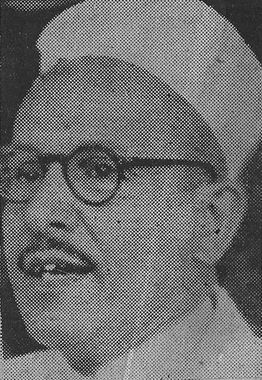
B. Pocker, Badekkandy, also spelled Poker, title Sahib Bahadur, as an Indian politician and lawyer from Tellicherry, north Kerala, Madras Presidency. He served as a member of the Constituent Assembly of India and as the Member of Parliament from Malappuram Parliamentary Constituency between 1952 and 1962.
Muslim League (Opposition), also rebel Muslim League, renamed as the All India Muslim League in 1980, was an Indian political party formed by the aggrieved leaders of Indian Union Muslim League in Kerala. The party was a member of the Communist Party of India Marxist-led Left front (later Left Democratic Front) in Kerala.
Malappuram is one of the 14 districts in the South Indian state of Kerala. The district has a unique and eventful history starting from pre-historic times. During the early medieval period, the district was the home to two of the four major kingdoms that ruled Kerala. Perumpadappu was the original hometown of the Kingdom of Cochin, which is also known as Perumbadappu Swaroopam, and Nediyiruppu was the original hometown of the Zamorin of Calicut, which is also known as Nediyiruppu Swaroopam. Besides, the original headquarters of the Palakkad Rajas were also at Athavanad in the district.
United Front, known until 1971 as Mini Front (1970–1971) and as Maxi Front (1971–1979) thereafter, was a coalition of political parties in Kerala state, India, which was the ruling combine in the state from 1970 to 1979. The coalition was formed by five political parties immediately before the 1970 Kerala Legislative Assembly election. It saw the inclusion a few other parties in the following years.
U. A. Latheef is an Indian politician belonging to Indian Union Muslim League. He was elected as a member of Kerala Legislative Assembly from Manjeri on 2 May 2021.
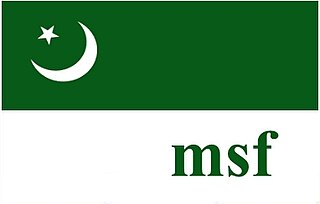
The Muslim Students Federation (MSF) is the student wing of Indian Union Muslim League party in Kerala, India.

Panakkad Sayyid Sadiq Ali Shihab Thangal is a sayyid (thangal) community leader and politician from Kerala, southern India. He currently serves as the Kerala State President, Indian Union Muslim League, Chancellor of Darul Huda Islamic University


